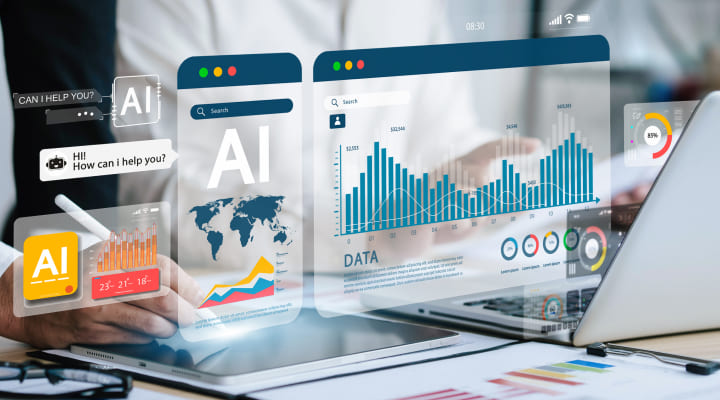Artificial intelligence (AI) has been redefining the way business is done on many levels for several years now. From automating simple processes to advanced predictive analyses and generative models learning from huge data sets – AI is becoming one of the most important tools of digital transformation. In this article, we present how AI affects modern business, what benefits it brings and in which areas it is most widely used.
1. AI as a driving force of automation
One of the most obvious applications of AI is the automation of business processes. Companies use machine learning (ML) algorithms and natural language processing (NLP) to automate customer service, manage documentation and process service requests. Chatbots, virtual assistants and intelligent RPA (Robotic Process Automation) systems allow a significant part of the operations to be performed without human intervention, accelerating work and reducing costs.
2. Personalization and customer experience
AI enables deep personalization of offers and communication with the customer. Recommender systems in e-commerce, personalized marketing campaigns or dynamic prices based on the analysis of user behavior are just a few examples of practical applications. Real-time data processing and predictive modeling allow companies to better understand customer needs and effectively respond to their expectations.
3. Predictive analytics and decision-making
AI supports strategic management through advanced predictive analytics. Companies can forecast sales, detect financial risks, predict employee turnover or identify market trends. As a result, decision-making becomes more informed and data-driven. AI tools are also used to optimize supply chains, production planning or inventory management.
4. Generative AI and new business models
Modern generative models such as ChatGPT or DALL•E open up new possibilities in content creation, prototyping and automation of creative processes. Companies use generative AI to create product descriptions, advertising campaigns and even graphic design. In sectors such as media, entertainment or fashion, AI is becoming a co-creator of new business models based on machine-generated content.
5. AI in HR and recruitment
HR departments are increasingly using AI tools to select candidates, analyze CVs, and even conduct initial recruitment interviews. AI can assess the match between a candidate's competences and the job profile and indicate risks related to turnover or cultural mismatch. This approach saves time and increases the effectiveness of recruitment processes.
6. Security and threat detection
AI plays a key role in cybersecurity, analyzing huge amounts of logs, detecting anomalies, and responding to threats in real time. Machine learning-based systems can detect potential attacks faster than humans and respond before a data breach occurs.
7. AI in knowledge and documentation management
In many organizations, AI is used to organize and share internal knowledge. Advanced semantic search engines, automatic document tagging, and systems that answer employee questions (e.g. based on company documentation) help to reach the information you need faster and manage organizational knowledge more effectively.
8. AI implementations and business challenges
Although AI brings enormous opportunities, its implementation is associated with challenges. It requires appropriate infrastructure, team competences and high-quality data. Additionally, ethical questions arise related to the transparency of algorithms, privacy and potential biases in data. Companies must approach AI strategically, combining technology with business goals and organizational culture.
AI is not a passing fad, but a long-term paradigm shift in business functioning. Well-designed and implemented solutions based on artificial intelligence allow companies to gain a competitive advantage, reduce costs and create more personalized, scalable services.
AI applications cover virtually every aspect of business - from production, through marketing and sales, to finance and human resources management. Its ability to analyze data, predict trends and make decisions supports organizations in quickly responding to changing market conditions and customer expectations.
For technology companies and software houses, AI is also becoming a tool that accelerates development, enabling the construction of intelligent applications, assistants or data analyzers. In an environment where response time and innovation are of key importance, the use of AI becomes not only an advantage, but also a necessity.
That is why companies should treat artificial intelligence not as an end in itself, but as a means to achieve the strategic goals of the organization. Investments in AI should go hand in hand with employee education, process change and openness to experimentation. Only then will this technology be able to fully realize its potential and bring real business value.

